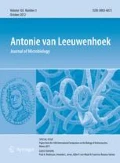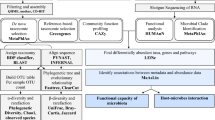Abstract
Recently, an “abnormal” faecal flora has been associated with Crohn's disease, a disease of unknown origin but with pertinent genetic predisposition. Therefore, it was investigated whether the faecal flora is under genetic influence in groups of monozygotic and dizygotic twins. Faecal floras of monozygotic twin siblings were found to be much more alike than those of dizygotic twin siblings. It is concluded that the resident faecal flora is under genetic influence and may be a useful parameter to study possible genetic backgrounds of other diseases.
Similar content being viewed by others
References
Hoeksma, A. and Winkler, K. C. 1963. The normal flora of the nose in twins. — Acta Leidensia 32: 123–133.
Holdeman, L. V., Good, I. J. and Moore, W. E. C. 1976. Human fecal flora: Variation in bacterial composition within individuals and a possible effect of emotional stress. — Appl. Environ. Microbiol. 31: 359–375.
Kirsner, J. B. 1973. Genetic aspects of inflammatory bowel disease. p. 557–575. In R. B. McConnell (ed.), Genetics of gastrointestinal disorders. Clinics in Gastroenterology Series, Vol. 2 (3). —W. B. Saunders Comp. Ltd., London, Philadelphia, Toronto.
Lewkonia, R. M. 1973. Inherited immunological abnormality and the gut. p. 645–660. In R. B. McConnell (ed.), Genetics of gastrointestinal disorders. Clinics in Gastroenterology Series, Vol. 2 (3). — W. B. Saunders Comp. Ltd., London, Philadelphia, Toronto.
Moore, W. E. C. and Holdeman, L. V. 1974. Human faecal flora: the normal flora of 20 Japanese-Hawaiians. — Appl. Microbiol. 27: 961–979.
Van de Merwe, J. P. and Mol, G. J. J. 1980. A possible role of Eubacterium and Peptostreptococcus species in the aetiology of Crohn's disease. — Antonie van Leeuwenhoek 46: 587–593.
Wensinck, F. 1975. The faecal flora of patients with Crohn's disease. — Antonie van Leeuwenhoek 41: 214–215.
Wensinck, F. 1976. Faecal flora of Crohn's patients. Serological differentiation between Crohn's disease and ulcerative colitis. p. 103–105. In I. T. Weterman, A. S. Peña and C. C. Booth (eds), The management of Crohn's disease. — Excerpta Medica, Amsterdam-Oxford.
Wensinck, F., Custers-van Lieshout, L. M. C., Poppelaars-Kustermans, P. A. J. and Schröder, A. M. 1981. The faecal flora of patients with Crohn's disease. — J. Hyg. 87: 1–12.
Wensinck, F. and Schröder, A. M. 1981. Preliminary study of the faecal flora in families of patients with Crohn's disease. p. 286–290. In A. S. Peña, I. T. Weterman, C. C. Booth and W. Strober (eds), Recent advances in Crohn's disease. Developments in Gastroenterology Series, Vol. 1. —Martinus Nijhoff Publ., The Hague, Boston, London.
Author information
Authors and Affiliations
Rights and permissions
About this article
Cite this article
van de Merwe, J.P., Stegeman, J.H. & Hazenberg, M.P. The resident faecal flora is determined by genetic characteristics of the host. Implications for Crohn's disease?. Antonie van Leeuwenhoek 49, 119–124 (1983). https://doi.org/10.1007/BF00393669
Received:
Issue Date:
DOI: https://doi.org/10.1007/BF00393669




